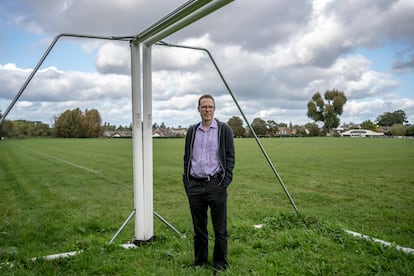This is the Liverpool data guru who discovered Roberto Firmino and Mohamed Salah
Ian Graham – the theoretical physicist who recommended the signing of manager Jürgen Klopp – has left the Reds. He now plans on offering his knowledge to other soccer clubs as an external consultant

Ian Graham was Liverpool FC’s director of research until just a few months ago. The 45-year-old theoretical physicist is one of the sharpest minds in the world of soccer. It takes the Welshman a whole day to watch just one game.
“I can’t trust my eyes,” he explains, in a video call with EL PAÍS. “Until I see all the data the next day, I don’t feel like I can understand the game well at all.” Graham’s doctorate is from the University of Cambridge, where he learned that what you see isn’t all that there is.
The researcher built much of Liverpool’s team based on what he found in this out-of-sight territory. There, he discovered Jürgen Klopp, Mohamed Salah, Roberto Firmino and Sadio Mané, to name just a few key figures. “When we signed them, they weren’t perfect players from the coach’s point of view, or from a scout’s point of view. Some of those players would never have made it if it hadn’t been for data analysis. This has had a big role in Liverpool’s success.”
He arrived at the club during the 2012-2013 season. The previous year, Liverpool had finished eighth in the Premier League… 37 points behind the champions, Manchester City.
And, seven years later, they won the title again, 30 years after the last time. Liverpool also won the Champions League (2019) and lost two other finals (2018 and 2022) against Real Madrid, all during Graham’s tenure.
Six months after the last championship match, the director of research ended more than a decade with the Reds, to set up his own firm. He has founded Ludonautics, where his data analysis skills are now within the reach of any team. “I want to help other clubs do the same thing I did at Liverpool.”
To bring out the invisible, he devised a metric that he called “goal probability added.” In soccer, goals are quite rare, so he looked for another way to measure how valuable a player can be for their team, without solely basing everything on goals and assists. “Let’s say you have the ball in the center of the field, without pressure. The question the model asks is: ‘how likely is it that you score?’ We take your situation and look at how many times it has happened in thousands of games. Let’s say there are 1,000 games. How many ended in a goal? Four. Therefore, the probability of the player scoring is four in 1,000. Then, [after the ball has been passed by said player], we ask the same question: ‘how many times has a possession ended in a goal?’ This time, it’s 17 out of 1,000. So, the [initial] player has added 13 goals out of 1,000 with their passing. If the player had [lost possession], those goals wouldn’t have been scored.”
Of course, data isn’t everything. “Data data analysis isn’t enough. It has to be an integral part of the decision-making process,” he explains. At Liverpool, he worked in a receptive context, alongside his boss — Michael Edwards, the sporting director — and the owners, Fenway Sports Group (also owners of the Boston Red Sox), who is represented in the UK by John Henry, one of the characters portrayed in the film Moneyball (2011). “When the data said: ‘Don’t sign this player’ or ‘sell this player’ or ‘please, please, Mo Salah is the one to sign,’ they listened.”
Firmino’s case is one of those that Graham likes to talk about the most. The Brazilian is always reluctant to give interviews. “The reason he was a little more hidden is that he had barely played with Brazil,” Graham recalls. “He didn’t score much at Hoffenheim, a mid-level [German] team. People didn’t know if he was a winger, a number 10, or a center forward — this scared them. But from a data point of view, this was his strength.”
When the Brazilian was hired in the summer of 2015, Graham and Edwards kept part of their operations under the radar. “Some players were signed just because [manager Brendan Rodgers] wanted them. And some [were signed] because Michael and I thought we needed to sign some good players, in addition to the ones Brendan wanted.” When one appeared, they passed him through another filter. “We took our team, added the player, simulated the following season and saw that, ‘Okay, this player would give us two more points, a 10% higher chance of qualifying for the Champions League.’ This also allowed us to calculate the monetary value [of a player].”
The manager who replaced Rodgers — Jürgen Klopp — also arrived via one of Graham’s scouts. In his previous season at Borussia Dortmund (Germany), the team finished seventh in the Bundesliga, 33 points behind the champions, Bayern Munich. But Graham’s data said that they had done much better than what the ranking showed. “Dortmund had been incredibly unlucky,” he notes, remembering his first meeting with the coach in Liverpool. He told him what he had seen, after barely glancing at the videos of his matches. “I think Jürgen hadn’t fully realized how much bad luck they had, so psychologically, it was an important meeting. I was telling him: ‘Jürgen, you’re still very good. Don’t you know that? Sometimes teams have very bad luck.’ The data is the calming factor — it explains that what matters is the long-term trajectory, not if a specific game has been won or lost.”
Klopp subsequently received one of Liverpool’s best signings through Graham. “Mo [Salah] wasn’t Jürgen’s first choice for that position,” he recalls. In reality, Salah wasn’t the most desired player in the Premier League. “Mo failed while he was at Chelsea [from 2014 to 2015]... no sporting director wanted to touch a failure.” But Graham believed they were wrong. His metrics said that Salah was one of the footballers who always got closest to scoring. Liverpool already tried to sign him in 2014, when he played for FC Basel, but Abramovich beat him to the punch. As Graham and his team didn’t have detailed data from the Swiss league, they studied Salah’s British and Italian matches. “He was 20-years-old and was like a mid-level winger in the Premier League. If you’re average at 20, by 24 or 27, you have options to be far better than that. And that’s what Mo’s career has been like.”
There was an explanation for Salah’s apparent failure. “He didn’t play. Why wasn’t he playing, who was ahead of him at Chelsea in 2014? Eden Hazard. If I had been the Chelsea manager, I would have also put Hazard ahead of Mo. So, it’s not that Mo did something wrong. There was a reasonable excuse for him not to play.” But there was something else that convinced them: “Data doesn’t offer the complete answer. The other thing is personality. Michael Edwards’ job was to take the data, the video analysis, the financial information and the personality of the footballer and make the decision. He told me that Mo Salah was the most professional and dedicated footballer he had ever met. He was desperate to be successful in the Premier League and prove everyone wrong.” And he did.
At Liverpool, Graham mainly influenced the signings — “that’s where the money is” — but many of his tools were also used to assist in the study of the game. “The first thing, in the post-match analysis, [had to do with] total expected goals, the total expected threat, if we were lucky or unlucky. But what was most useful was the analysis of rival players. For the set-piece specialist, the data could give him information about the dangers of the rival in the corners.”
Did this have anything to do with the corner kick that eliminated Barcelona in the 2019 Champions League semi-final, when Liverpool overcame a three-goal deficit to defeat Barcelona 4-3? “No. All the credit for that has to go to James French, the opposition analyst. With the video, he realized that the Barcelona players — whenever they were awarded a corner kick — began to complain to the referee, to talk among themselves... the ball boys were given instructions to return the ball immediately. I would love to be able to say that the victory was because of me, but it wasn’t.”
Sign up for our weekly newsletter to get more English-language news coverage from EL PAÍS USA Edition
Tu suscripción se está usando en otro dispositivo
¿Quieres añadir otro usuario a tu suscripción?
Si continúas leyendo en este dispositivo, no se podrá leer en el otro.
FlechaTu suscripción se está usando en otro dispositivo y solo puedes acceder a EL PAÍS desde un dispositivo a la vez.
Si quieres compartir tu cuenta, cambia tu suscripción a la modalidad Premium, así podrás añadir otro usuario. Cada uno accederá con su propia cuenta de email, lo que os permitirá personalizar vuestra experiencia en EL PAÍS.
¿Tienes una suscripción de empresa? Accede aquí para contratar más cuentas.
En el caso de no saber quién está usando tu cuenta, te recomendamos cambiar tu contraseña aquí.
Si decides continuar compartiendo tu cuenta, este mensaje se mostrará en tu dispositivo y en el de la otra persona que está usando tu cuenta de forma indefinida, afectando a tu experiencia de lectura. Puedes consultar aquí los términos y condiciones de la suscripción digital.









































